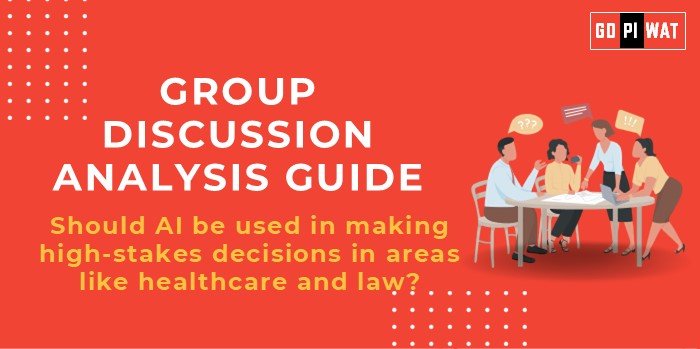📋 Group Discussion (GD) Analysis Guide
💡 Topic: Should AI be used in making high-stakes decisions in areas like healthcare and law?
🌟 Introduction to the Topic
AI technologies are transforming decision-making processes globally, offering precision and efficiency in sectors like healthcare and law. From diagnosing diseases to assisting judicial judgments, AI promises revolutionary applications. However, its integration into high-stakes decisions raises ethical, technical, and societal questions about fairness, accountability, and the potential consequences of machine-driven choices.
📊 Quick Facts and Key Statistics
- 💰 Healthcare AI Market: Valued at $14.6 billion in 2023, projected to grow at 37.1% CAGR by 2030 (Source: Market Analysis).
- ⚖️ Judicial AI Use: 30% of global legal systems have piloted AI tools for case evaluations or sentencing.
- ⚠️ Bias Risk: A 2023 MIT study showed AI-based hiring systems had a 15% error rate in assessing minority groups.
- 💡 Cost Reduction: AI can reduce diagnostic costs by 20%-30% (Healthcare Economics Journal, 2023).
👥 Stakeholders and Their Roles
- 🏛️ Governments: Establish ethical frameworks and regulations.
- 👩⚕️ Healthcare Providers: Use AI for diagnosis and treatment planning while ensuring ethical oversight.
- ⚖️ Legal Systems: Implement AI tools for efficiency but ensure adherence to judicial fairness.
- 🌍 Citizens: Advocate for transparency and accountability in AI applications.
- 💻 Tech Companies: Develop AI systems prioritizing fairness and inclusivity.
🏆 Achievements and Challenges
Achievements:
- 🚀 Efficiency Gains: AI reduces diagnosis and legal case processing times significantly.
- 📈 Accuracy Improvements: AI-assisted diagnostic tools achieve 95% accuracy in some conditions, surpassing human benchmarks.
- 🌐 Broadened Access: AI chatbots like GPT-4 increase accessibility to legal advice.
Challenges:
- ⚖️ Bias in AI Models: Algorithms can perpetuate societal biases, affecting fairness.
- ❓ Lack of Accountability: Assigning blame for AI errors remains unresolved.
- ⚠️ Ethical Concerns: Balancing automation and human intuition is contentious.
🌐 Global Comparisons:
- 🇬🇧 Healthcare AI in the UK: National AI Lab ensures rigorous ethical oversight.
- 🇪🇪 Judicial AI in Estonia: AI handles minor civil cases with 98% efficiency.
📖 Case Study:
🇮🇳 AI in India’s Healthcare: AI-based cancer diagnosis tools deployed in Tata Memorial Hospital reduce diagnostic timelines by 30%.
💬 Structured Arguments for Discussion
- ✅ Supporting Stance: “AI ensures faster, more accurate decisions, which is critical in healthcare and judicial emergencies.”
- ❌ Opposing Stance: “The opacity and bias in AI systems can lead to severe injustices in life-critical sectors.”
- ⚖️ Balanced Perspective: “While AI can augment decision-making efficiency, its use must be complemented by human oversight to ensure ethical integrity.”
🔑 Effective Discussion Approaches
- 📊 Opening Approaches:
- Start with global comparisons to establish context: “In Estonia, AI resolves civil disputes faster, but does this efficiency compromise justice?”
- Use impactful statistics: “AI tools can reduce diagnostic costs by 30%, but at what ethical cost?”
- 💡 Counter-Argument Handling:
- Rebut bias claims: “AI bias stems from human data; better datasets reduce this risk.”
- Address ethical concerns: “Human-AI collaboration minimizes errors and enhances outcomes.”
📊 Strategic Analysis of Strengths and Weaknesses
- 💪 Strengths: Efficiency, precision, scalability.
- ⚠️ Weaknesses: Bias, accountability issues.
- ✨ Opportunities: Collaborative frameworks, AI transparency innovations.
- ⚡ Threats: Misuse, ethical violations.
📚 Connecting with B-School Applications
- 🌍 Real-World Applications: Link AI use to operational efficiencies in healthcare management and legal consultancy.
- ❓ Sample Interview Questions:
- “What ethical frameworks should guide AI in high-stakes decisions?”
- “How can AI’s bias issues be mitigated?”


